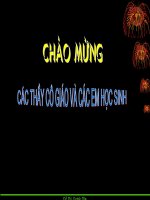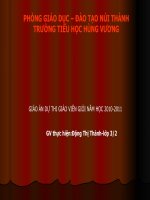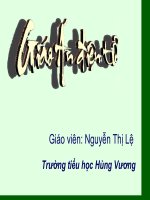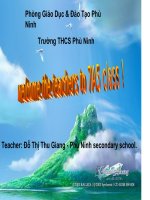bai giang thi giáo viên giỏi lop 10 test yourself d
Bạn đang xem bản rút gọn của tài liệu. Xem và tải ngay bản đầy đủ của tài liệu tại đây (748.38 KB, 19 trang )
Nguyen Chi Thanh High School
Teacher: BÙI THỊ HỒNG THẮMI. Listening
Vocabulary:
-
geyser (n)
-
pick (v)
-
feed (v)
-
hunt (n)
1. Why do people go to a national park?
To enjoy nature.
2. When did Yellowstone become a national park?
In 1872.
3. Is Yellowstone the smallest national park in the world?
No, it isn’t. It is the world’s largest park.
4. How many geysers does Yellowstone have?
It has about 70 geysers.
5. What mustn’t visitors do in Yellowstone?
They mustn’t pick the flowers, feed or hunt the animals.
Listen to the passage and answer the questions.II. Reading
Vocabulary:
- conservation (n)
- management (n)
- resource (n)
- ideal surrounding
- quality (n)
Task 1
a. rubbish and useless things:
b. scenery:
c. main road that connects towns or cities:
……………………….…
d. good for your health:
Find the words or phrases which mean the
following.
junk and litter
landscape
highway
healthy
Decide whether the following statements are TRUE (T)
or FALSE (F).
a. If people didn’t practise conservation, they would
lose all the resources necessary for life.
b. People practise conservation so that they can
enjoy living.
c. People can practise conservation by looking for
an interesting place to live in.
d. Without parks and playgrounds, conservation
can’t be practised.
e. Ideal surroundings mean clean landscapes.
f. Conservation helps animals and plants exist and
develop.
Task 2:
T
F
T
F
T
T
c. People can practise conservation so that we keep
our environment healthy and safe – and an
interesting place to live in.
d. Without parks and playgrounds, conservation can
still be practised.
Type If - clause main - clause
2 S+ V2/Ve
to be→ were
would + inf
3 had + V3/Ved would have + V3/Ved
A B
1. The door has been I would have bought a new
house.
2. If I were you opened by him.
3. If I had had more money I would love him.
PASSIVE VOICE
Active : S + V(ord) + O
passive : S + V(p.p) + by agent
III. Grammar
a. Everything is ready for your lesson. The board (1. clean)
………… and the lights (2. turn
on) . All the students (3.
wait) for you.
b. If Mary (1. know) …………………… anything about car
mechanics, I’m sure she (2. help) us fix
the car, but I think she (3. know) even less
than we do.
c. I (1. decide) (2. stay) at home
last night.
I (3. go out) if I (4. not be)
so tired. so tired.
Put the verbs in brackets in the correct form.
has been cleaned
have been turned on
are waiting
knew
would help
decided to stay
would have gone out
hadn’t been
knows
Hellen
Alex
The letter
of invitation
IV. Writing
Dear Alex,
a) You / be delighted / know / Father / give / party / celebrate
/ New Year /.
b) He / invite / some / relatives / and / friends / make / party
success /.
c) I / too / invite / number / friends / neighbourhood /.
d) Mother / ask / me / tell / you / come home / New Year
celebration /.
e) I / sure / you / be here / time / share / fun / us / that day /.
Love,
Helen
Complete the invitation letter below, using the words
and phrases given as cues.
a) You will be delighted to know Father is giving a
party to celebrate the New Year.
b) He has invited some of our relatives and his
friends to make the party a success.
c) I too have invited a number of my friends in the
neighbourhood.
d) Mother has asked me to tell you to come home
for the New Year celebration.
e) I’m sure you will be here in time to share the fun
with us on that day.
Complete the invitation letter below, using the words
and phrases given as cues.
Dear Alex,
You will be delighted to know Father is giving a party
to celebrate the New Year. He has invited some of
our relatives and his friends to make the party a
success.
I too have invited a number of my friends in the
neighbourhood. Mother has asked me to tell you to
come home for the New Year celebration.
I’m sure you will be here in time to share the fun
with us on that day.
Love,
Helen
The invitation letter
Homework
Prepare the 45 – minute test.
Review unit 9, 10 and 11.









